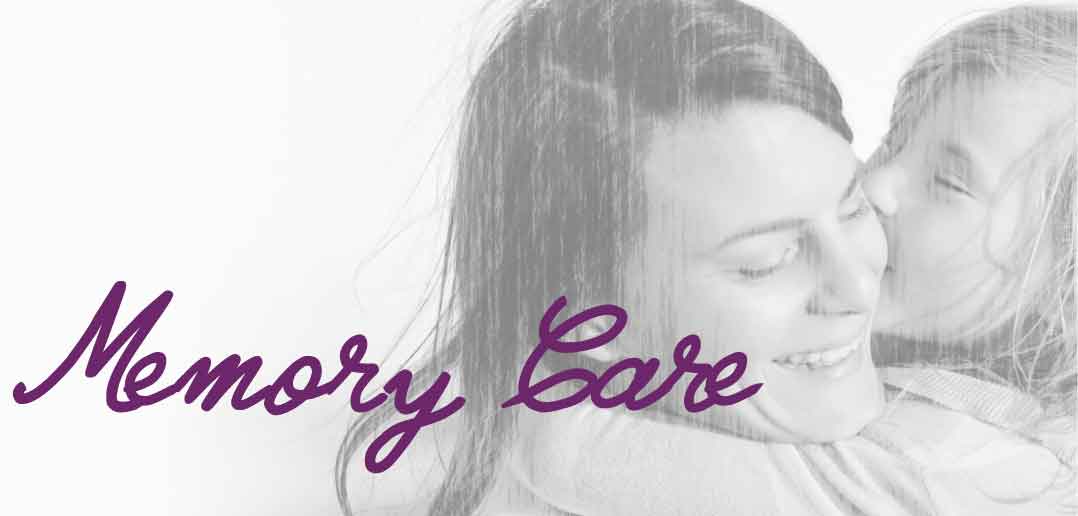When it comes to aging, what is normal and alternatively, what isn’t, has become a major focus in finding the appropriate level of care throughout one’s senior years. While memory loss will likely affect us all, there are more serious conditions that aren’t a normal part of aging – more specifically, Alzheimer’s disease and dementia.
As the best place to start is with a solid understanding of what we are all dealing with, both now and moving into the future, here are some facts from the Alzheimer’s Association which can also be found along with more information at www.alz.org:
• Dementia is a general term for a decline in mental ability severe enough to interfere with daily life.
• Dementia is not a specific disease. It’s an overall term that describes a wide range of symptoms associated with a decline in memory or other thinking skills severe enough to reduce a person’s ability to perform everyday activities.
• While symptoms of dementia can vary greatly, at least two of the following core mental functions must be significantly impaired to be considered dementia: Memory, Communication and Language, Ability to Focus and Pay Attention, Reasoning and Judgment, and Visual Perception.
• Alzheimer’s disease is the most common form of dementia.
• Alzheimer’s is not a normal part of aging, although the greatest known risk factor is increasing age and the majority of people with Alzheimer’s are 65 and older.
• Alzheimer’s has no current cure, but treatments for symptoms are available and research continues. Today, there is a worldwide effort under way to find better ways to treat the disease, delay its onset, and prevent it from developing. Early diagnosis and intervention methods are improving dramatically, and treatment options and sources of support can improve quality of life.
“Studies suggest that early diagnosis can lead to better and more effective care, which can improve the life of both the patient and the family,” explains Mark Kresl of Midwest Geriatrics, Inc. and the Senior Health Foundation. “That is why it’s important to be very aware of early symptoms. For example, moodiness and behavior changes are often misread as depression, but can be early warning signs of Alzheimer’s. When in doubt, consult with your doctor. The Alzheimer’s Association (www.alz.org/nebraska) is a great resource for the public. The organization offers extensive information on its website as well as free educational sessions. If you suspect that you or a loved one may be showing early signs of Alzheimer’s, visit the website for information and resources that are available to you.
When the time has come when you or your loved one needs 24-hour care, look into communities that specialize in caring for people with Alzheimer’s disease or dementia. These conditions require the care of experts specifically trained and focused in memory care issues.
Midwest Geriatrics, Inc. operates one of the largest Alzheimer’s residences in the state of Nebraska. House of Hope Alzheimer’s Care offers specialized memory care for people in all stages of dementia and Alzheimer’s disease. We have been serving Omaha seniors for 109 years and provide a personalized care plan for each individual. We know each person is different, so your loved one’s experience at House of Hope Alzheimer’s Care will be unique and tailored to his or her specific desires. We go beyond providing the care that they need, and our priority is to welcome them to an environment where they will feel comfortable, safe, and at home. At House of Hope Alzheimer’s Care, we value individual wishes as well as their medical needs.
There are many resources to help you both deal with the realities of Alzheimer’s disease and better understand your options for care. Caring for a person with dementia or Alzheimer’s disease is challenging both physically and mentally. There are support resources available to help you better care for the family member as well as care for yourself. Give yourself a break by hiring an in-home non-medical service, like Empower Home Care, a few hours a week. Empower Home Care can take care of some of the things around the house such as cleaning, laundry, and cooking. They can also give you a much-needed break.
Finally, there are a few things you can do to help avoid becoming a statistic. A healthy lifestyle can reduce the risks of acquiring Alzheimer’s disease. High blood pressure, high cholesterol, and diabetes present higher risk factors. A healthy diet and exercise can reduce the chances of acquiring Alzheimer’s disease. Additionally, education has proven to reduce the odds of getting Alzheimer’s disease. Learning, even at an advanced age, can have positive benefits. Take classes, learn music, learn a language, or find another enjoyable way to exercise your brain!”
“When it comes to how we interact with and care for our loved ones with dementia or Alzheimer’s disease, it’s important to live within their reality,” further advises Jim Janicki of Hillcrest Health Services. “Oftentimes when caregivers start this difficult journey with their loved ones they are quick to correct, especially when it comes to fabricating or misremembering a story. However in actuality, going along with what they are saying is advantageous because you avoid adding any stress to the situation. Particularly with dementia and Alzheimer’s, with indiscriminate memory loss certain things that are most frequently recalled become a cyclical pattern of emotional highs and lows. In these cases, deflection is often a better approach for everyone instead of going through the same thing over and over. For example, if your loved one has forgotten a death they will grieve the same each time you tell them that the person has passed. The disease isn’t fair to those who have it, so in dealing with the stress of everyday life, being happy and comfortable is most important in whatever way it is achieved.
Caregivers often try to be everything to everyone, so they tend to avoid asking for help until a breakdown occurs. Many times they are embarrassed of how a loved one might act when others are around or don’t feel comfortable with sharing the burden for a variety of different reasons. It’s important to be aware of the many resources that are available and to reach out when you need them. Furthermore, support is key and it’s helpful to talk to other people who are going through the same things. Even though it’s your loved one, providing care for them is still by all rights a job and no one could possibly survive working 160 hours a week. Regrettably you can’t realistically be there for them 24/7 even if you really wanted to. Therefore, build a schedule and figure out how best to manage it, including finding resources to fill in the gaps.
For those whose loved ones aren’t ready to move to a memory care facility, home care is a wonderful option. In addition to meeting the daily needs of the individual, a home care professional provides the companionship needed to keep someone safe at home when the caregiver can’t be there. Adult day services are another helpful option, with flexible hours and transportation provided along with the benefit from social interaction and mental stimulation. When it comes time for a higher level of care, making the move to a facility that specializes in memory care is a must. At Hillcrest we now offer two memory support assisted living residences, Hillcrest Mable Rose and our newest facility, The Grand Lodge at Hillcrest Estates. Moreover, we offer the area’s largest support group run by Dr. Anna Fisher, who has also spearheaded innovative research in the area of memory care, most recently applying principles of the Montessori method to engage those with memory disorders.
Keep in mind that with dementia your loved one will progress through many different phases, and as such their needs will shift over time. Think of the brain as a muscle – the more engaged one is the more the disease is kept at bay. Finally, be open to utilizing the myriad of excellent resources that are available and look to others for support along the way.”
“When a family is faced with taking care of someone with memory issues the caregiving journey can be long,” adds Michaela Williams of Care Consultants for the Aging. “Being aware of what is available will help when you are faced with the reality of needing extra assistance with the care of your loved one. Care Consultants produces the ElderCare Resource Handbook that will list all the senior services available in the Omaha and Lincoln metro areas. We have a section that is dedicated to Assisted Living Facilities that specialize in Alzheimer’s/Dementia care, and we will indicate what Skilled Nursing and Rehabilitation Centers have a dementia unit. The handbook can be viewed for free on-line at www.careconsultants.com and it is available in print.
There are many options for help when you need more care for your loved one. Discovering what the government offers, what insurances and financial options your loved one has and getting your legal documents in place will help when needing to make choices for your loved one. The Alzheimer’s Association offers many support groups and services to aid those who are caring for those with memory problems. Knowing about the different types of Alzheimer’s and dementia can help get the caregivers on board with what cares may be needed. Once you know what resources you have then you can line up the necessary services.
Many can stay at home throughout their caregiving journey but sometimes moving to a care center is the best choice too; each set of circumstances is different. Care Consultants is a home care registry that screens and places caregivers with families needing help. Caregivers can assist with tasks such as bathing, dressing, meal prep, transportation and light housekeeping. Caregivers are insured and bonded and can work from one to 24 hours a day. We offer both medical and non-medical cares for those who need assistance with maintaining an independent lifestyle.”
As you can see, when it comes to addressing memory care, no matter where you are at on the journey and what lies ahead for you or your loved one, it is comforting to know that there is help at all points along the road.
“The Alzheimer’s Association in Nebraska has been very busy lately and Comfort Keepers is happy to lend support,” says Jennifer Dil of Comfort Keepers Omaha. “We recently participated in both the Sarpy and Omaha Walks To End Alzheimer’s and look forward to sponsoring pet booths for those supporters who want to bring their dogs to the Walks in 2016. Comfort Keepers also supported the Alzheimer’s Association with their town hall meeting in Omaha, as they reached out to the community to see how best to focus their initiatives on LB 320. One of the ideas we particularly encourage from that town hall meeting related to a possible Amber Alert for adults with dementia. This program is already going strong in many other states and we applaud the development of an alert system for vulnerable adults in NE, who could wander from home and get lost.
If you have not had a loved one or friend with dementia it is hard to describe the anxiety and frustration that can accompany their care. One of my former colleagues likened interacting with her mother, who has dementia, to dealing with a 140 pound toddler who looks like her mom but no longer recognizes her daughter. ‘I want a bowl of ice cream.’ ‘But Mom, you’ve already had two bowls and you haven’t eaten your dinner.’ ‘How dare you lie like that? I haven’t had any ice cream at all.’ (Her dilemma: Go and get another bowl or continue the argument?) Not all dementia is represented like her scenario. Some dementias are very gentle and hardly noticeable. Some are worse, with temper tantrums and possible biting and kicking.
With over 85 types of dementia and no known cure, dementia is rapidly becoming the bane of the Baby Boomers. Unfortunately, we are seeing dementia presented in ever younger adults. 60 year olds with dementia are becoming common and 50-year-olds with the diagnosis are the new surprise. Regardless of the age of the dementia victim, there is a need for skilled caregivers who know how to work with these clients. We train Comfort Keepers to work with those who have dementia and require skills testing before caregivers set foot in anyone’s home.
We have a wide range of experience assisting clients with memory loss. Examples include veterans with dementia, Parkinson’s related dementia, undiagnosed dementias and we even providing staffing for memory care in assisted living. If you find yourself or someone you know needing help in caring for someone with dementia, we will help you and give you straight answers. Please don’t go through this alone. We are here for you, and can be reached at (402) 991-9880.”
“Three of the most important things with respect to memory care are early detection, education and acceptance,” emphasizes Lisa Arp of SilverRidge Assisted Living & Memory Support Community. “I can’t tell you how many tours I have done at SilverRidge with families who are either in denial of the problem or whose loved ones have been in such a structured environment that they haven’t noticed any issues until taken out of that familiar place. So often guilt is felt by family members or no one wants to come to terms with the fact that there is a problem. If a person does not want to leave the home, get dressed, bathe or even sometimes eat, there is a problem.
It’s common to overlook dementia because a person’s memory is seemingly there, but those in the early stages of dementia have the tendency to come up with ways to mask it or hide it from you. By not leaving the house, showing signs of weight loss, or not taking medication they are giving you signs without even saying a word. In most cases the loved one already knows they have a problem but it is certainly not an easy thing to admit, so it’s up to YOU as a caregiver to educate yourself and stay ahead of the curve. There are plenty of resources online, as well as through the Alzheimer’s Association, at any library, or through your local senior care facilities and organizations. You’ll want to do this sooner rather than later because if you wait too long, it only gets harder to try and persuade that person to cooperate. If your loved one has not been evaluated by a specialist in dementia, I would make an appointment as soon as possible. Talk to your doctor for a referral.
At SilverRidge we can help in many ways, just give us a call. With 15 years of experience with caring for the senior population, we are well-versed in signs of dementia and the Alzheimer’s Association visits quarterly to work and train with our staff to ensure they have the proper skills to take care of folks with dementia. I also have a radio show ‘Aging Matters with Lisa’ on 660 AM or 94.5 FM Wednesdays and Thursdays from 2:30 to 3:00 p.m. I have had guests on the show frequently who deal with dementia on a daily basis and representatives from the Alzheimer’s Association who explain warning signs. Early detection and acceptance by everyone involved is key to treatment of this disease that currently has no cure. There ARE ways to continue to have a good quality of life. That is why educating yourself is so important.
Above all, don’t be afraid to ask and don’t be in denial. Don’t just tell yourself I will do it tomorrow or sweep it under the rug. Right now we are preparing for major growth in the population that will be diagnosed with the disease. It does not discriminate. Understanding the symptoms is the first step, and it’s critical to recognize that it is not just memory loss but a host of other things that can surface. Furthermore, being at home is a nice thing but sometimes it is not the right thing for financial, safety and longevity reasons. What if the caregiver passes away? Where does the loved one go in that event? What funds will be available to them? Are they able to make their own life choices still both medically and financially? If they aren’t, who will? Be aware, be informed and be prepared for all possible circumstances. All of these decisions include doctors, lawyers, financial advisors and possibly long-term care facilities.”
“It is important to know what to look for when it comes to your loved one and changes with their memory so you can talk to your doctor and get timely and appropriate care for their safety and health well-being,” agrees Kristina Krumme of Elk Ridge Village Active Retirement Community. “Is your loved one seeing a specialist or geriatric physician? When it comes to assessing a retirement community, be sure to look for an accommodating layout. How many apartments does the memory care accommodate and are there single or shared floor plans? What would an activities schedule and individualized care plan for your loved one look like? How do meals look and how does the dining experience go on a daily basis for your loved one? Be sure to ask about the staff training and experience too. If different living arrangements become necessary, make the decision to move to a memory care or assisted living/retirement community before the disease progresses too far. The longer you wait, the harder it will make the transition for your loved one and for you as the spouse or family member.
Furthermore, it is important to get a health care and financial Power of Attorney in place before your loved one is unable to make those decisions. It’s also beneficial to look into Long Term Care insurance before the diagnosis and as previously mentioned, to learn the signs and symptoms of Alzheimer’s and dementia. A geriatric assessment is helpful for the family to know what stage of memory loss their loved one is experiencing. Also, talk frequently to physicians and other family members. A few other good resources in the Omaha community would be the Alzheimer’s Association and the Eastern Nebraska Office on Aging (ENOA).
She continues, “At Elk Ridge Village, we provide a safe living environment for the individual as well as peace of mind for their loved ones. It is a safe and home-like atmosphere where residents can enjoy a fulfilling and satisfying lifestyle. We can also be a resource to families as they are going through this for the first time. Elk Ridge Village offers an Alzheimer’s support group that meets on the third Monday of every month. We also have specially trained staff in Alzheimer’s and dementia, licensed nursing staff and a broad physician base. This help will benefit your loved ones health and wellness and also help keep them safe. It also will provide education for you and your family.”
Unfortunate as it is, today the varied medical conditions that have the potential to affect our memory function are much more prevalent than ever before and as such, are to be taken very seriously. With the brightest minds in medical research and healthcare leading the way, the more we learn the better equipped we are to make the best decisions possible until we find a cure. With dementia and Alzheimer’s disease affecting so many, there are currently a wealth of resources that are available to provide assistance, guidance and support. Reaching out is the first step, and a tremendously important one at that.







